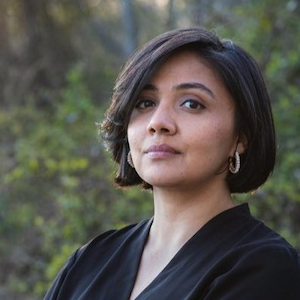
Mariam Durrani Professorial Lecturer Peace, Human Rights & Cultural Relations
- Degrees
- Joint Ph.D. Anthropology and Education, University of Pennsylvania, 2016
M.A. Rhetoric and Composition Studies, University of New Mexico, 2006
B.S. Systems Engineering, University of Arizona, Minor in Math, 2003 - Languages Spoken
- Urdu, Hindi, Punjabi
- Book Currently Reading
- Colonial Racial Capitalism, edited by Susan Kosher, Lisa Marie Nacho, Jodi Byrd, Brian Jordan Jefferson (Duke, 2022)
- Bio
-
Dr. Mariam Durrani is a decolonial feminist scholar and linguistic anthropologist with a research focus on global racialization, migration, education, and the geopolitics of war. Through her work, she seeks to shift how academic scholarship and public discourse reflects and reckons with the impact of global wars and related insecurity, especially for college students in the US and Pakistan through multi-sited ethnographic research and multimodal methodologies.
Dr. Durrani's 2022 research article “The Imperial Optic: Mapping Intersections between the Global War on Terror and Higher Education in the US and Pakistan” analyzes how US War on Terror policies influence college access for students in both Lahore, Pakistan and New York City, USA. Her current book project "The Imperial Optic: At the Intersection of Migration, Racialization, and Higher Education," based on long-term (2013-2019) multi-sited ethnography at a private Pakistani university and a public US college, broadens the scale and scope of how we understand the impact of the US Wars on "Terror" in higher education across two contexts. In her work, Dr. Durrani uses the concept of the “imperial optic” to conceptually frame these contact zones as the intersection of the surveillance state and imperial geopolitics in higher education. As such, the book offers a study of empire “from below” by focusing on how students negotiate and navigate imperial formations in their everyday lives.
Her second research project, the Roti Collective, consists of academic events and public engagements about roti—the everyday food eaten in Asia, Africa, the Caribbean, Latin America, and their diasporas everwhere. This work analyzes roti-making as a critical site to study imperial intimacies by attending to the meaning that different groups, shaped by Euro-American colonialism, ascribe to making and eating roti in the 21st century. The Roti Collective involves students and community members to collaborate on a digital archive (found on Instagram @theroticollective), a podcast (on Spotify), and a forthcoming website. Designed for multiple audiences, the ambition is to consider how roti’s global migrations tell an expansive account of racial capitalism and colonial displacements, the Global South and its cultural knowledges, in relation to contemporary politics and practices around gender, patriarchy, migration, and racialized labor.
- See Also
- Personal Website
- For the Media
- To request an interview for a news story, call AU Communications at 202-885-5950 or submit a request.
Teaching
Spring 2024
-
SIS-711 Topics in Intercltr/Int'l Comm: Global Equity and Inclusion
-
SISU-205 Intercultural Communication
Fall 2024
-
SIS-640 International Communication
-
SISU-205 Intercultural Communication
-
SISU-205 Intercultural Communication
